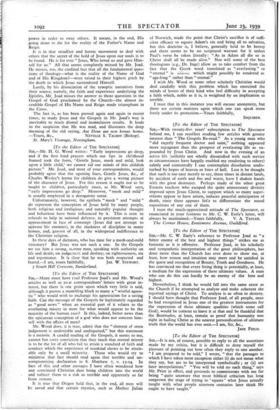[To the Editor of THE SPECTATOR] SIR, — It is not, of
course, possible to reply to all the assertions made by my critics, but it is difficult to deny myself the pleasure of pointing out how often they reply to one another. " I am prepared to be told," I wrote, " that the passages to which I have taken most exception either (i) do not mean what they say, but are to be interpreted symbolically ; or (ii) are later interpolations." " You will be told no such thing," says Mr. Prior in effect, and proceeds to commiserate with me for being " quite unaware that most biblical criticism has long outgrown the stage of trying to ' square ' what Jesus actually taught with what people nineteen centuries later think He ought to have taught." But this, as it turns out, is precisely what I am told. Jesus says " take no thought for the morrow." " Thought " does not mean " thought," says the Rev. Clarke ; it means " anxiety." Jesus says people are to " hate " their relations ; this, says the Rev. Clarke, " is not a general, but a particular saying of Christ's, relative to Himself and His claims, such as could not have been misunderstood." I do not know whether the fact of being a " particular saying " of Christ's means that it is a saying which does not mean what it says ; I presume that this is what Mr. Clarke intends to imply, since otherwise I am at a loss to understand why he should have thought it relevant to make this distinction between " particular " and " general " sayings. Now if it does not mean what it says, it may very easily " have been misunderstood "; but if, as I see no reason to doubt, it does, I agree with Mr. Clarke that nobody could possibly misunderstand it. We know only too well what is meant by " hating," and that precisely is what Jesus bids us do. I conclude that if the saying is to be taken literally, Mr. Clarke is right in thinking that it " could not have been misunder- stood," but if, as he appears to think, it is not to be taken literally, then it seems to me misunderstanding is only too likely.
" I never feel," writes another correspondent, " that in refer- ring to ' Hell ' Jesus meant a material Hell, in which sinners burn for ever. I think He meant the Hell we all bring upon ourselves here and now." Quite so. Jesus does not mean what He says, but " what people nineteen centuries later think He ought to have taught."
Another writes to tell me that " it is impossible to take this or that sentence to be quoted exactly as it was spoken at the time," because " there have been so many translations of the Bible." If they are not to be taken literally they must be interpreted—for example, Mr. Rendall interprets the injunc- tion to buy swords as ironical and the parable of the Unjust Steward as being addressed specifically to Judas—and the interpretation will presumably be in terms of the enlightened humanitarian thought of the twentieth century; in other words, when Jesus's doctrine is not good enough for us we must improve it, and do.
Even Mr. Wood, whose article I read with respect, pri- marily because of his courageous determination to grasp the nettle of Jesus's " roughness " instead of explaining away whatever appears repugnant, finds it impossible to keep to his own good resolution, and instead of " nettle-grasping " in the matter of Jesus's commendation of the innocence and humility of good little children, tells us in effect that what Jesus means is the innocence and humility of good scientists. I don't believe a word of it.
But I do agree strongly with Mr. Wood when he says, " Classify Jesus with Confucius and Lao-tze, with Buddha and Socrates, and at once we have the uneasy feeling of a misfit." He can only be rescued from this standard of com- parison and restored to the desired dimensions, Mr. Wood thinks, by an acceptance of His " immediate awareness of God as His Father." But why, one wonders, should we accept the assertion of an awareness which, taken at its face value, is to me at least very difficult? Answer : presumably because of the wisdom and love of Jesus's teaching, which is so wise and so loving as to appear divine. But, as I have pointed out, the teaching is not always wise and it is rarely loving. lf, then, we cannot found our belief in Jesus's supernatural origin or the excellence of His ethics, nor trust His ethics because of his independently established supernatural origin, we are in a bad way. For my part, I simply cannot reconcile Mr. Wood's picture of Jesus's God as " active love " with Jesus's oft-repeated assertion of God's eternal punishment of sinners; an eternally punishing God seems to me to be hating and hateful, not actively loving and lovable.—I am, Sir. &c.,











































 Previous page
Previous page